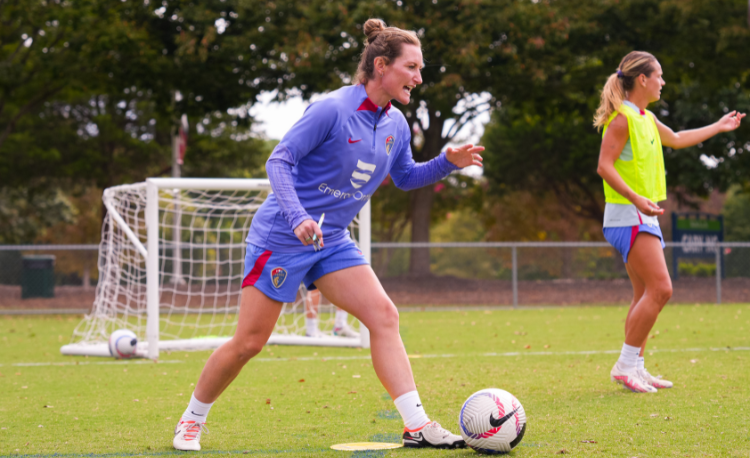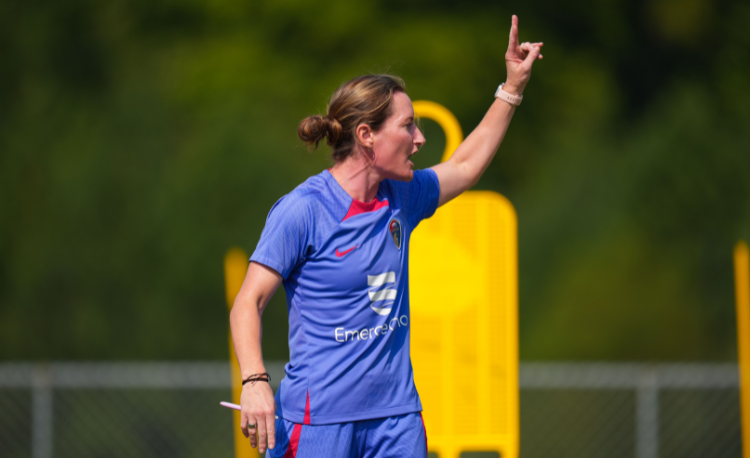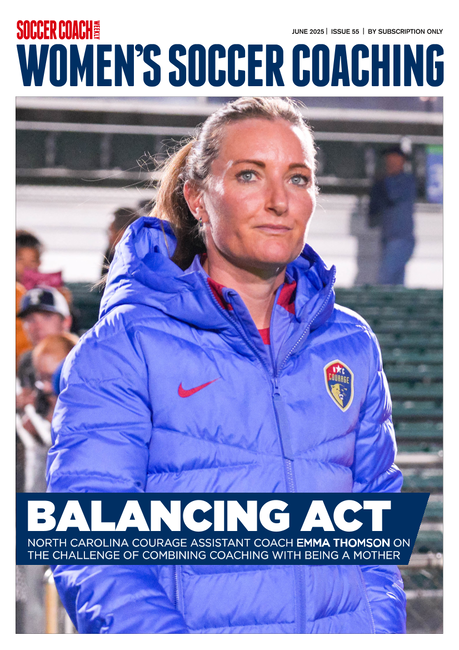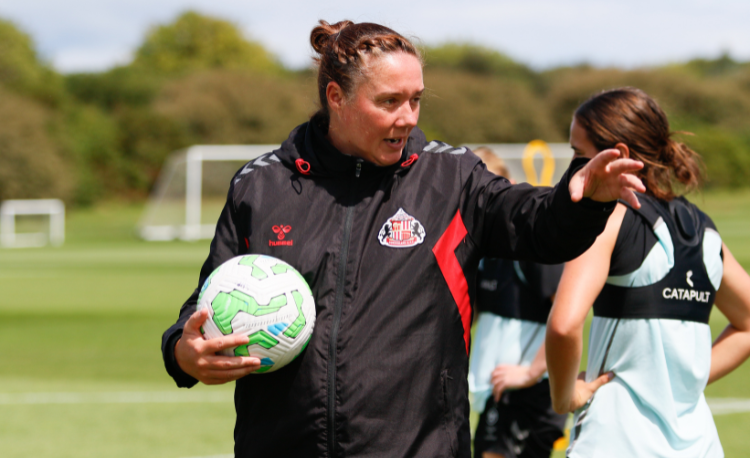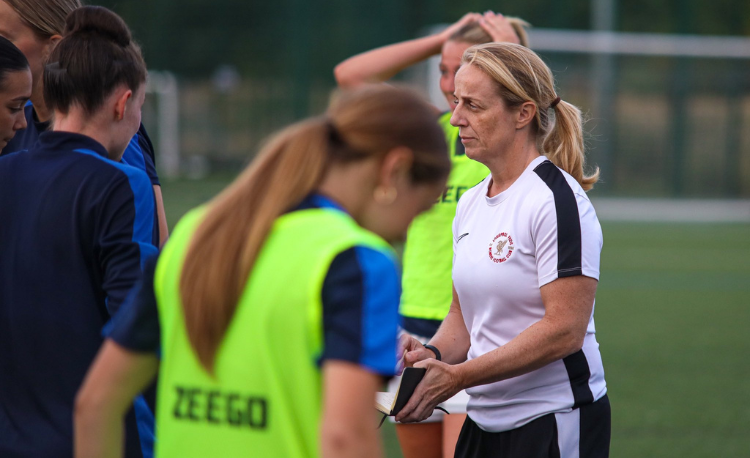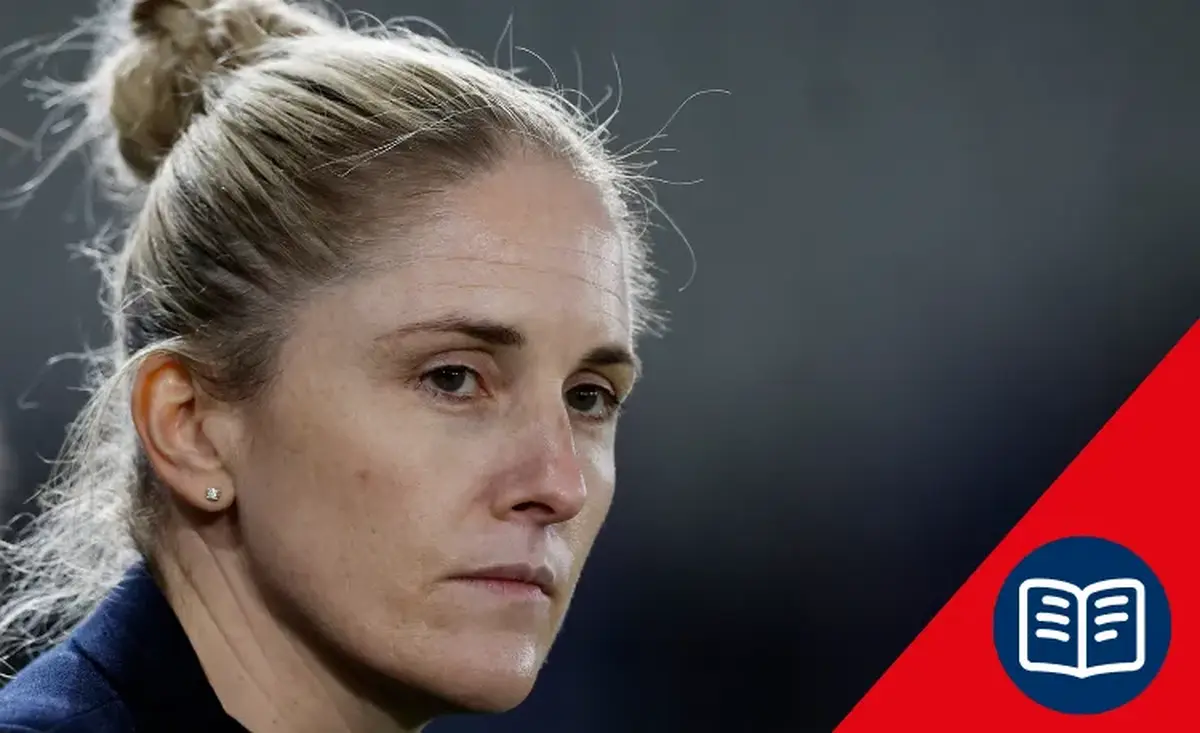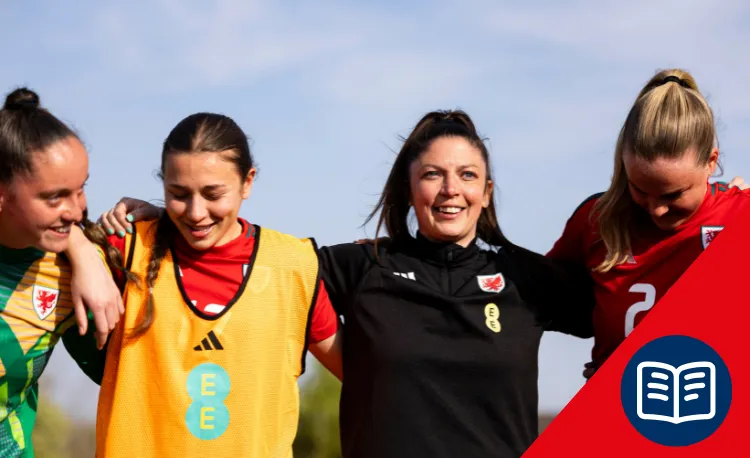Emma Thomson: 'We have to talk'
North Carolina Courage assistant coach Emma Thomson has an important second job, as a mother. She tells Carrie Dunn more conversations must take place to improve support to women in the game trying to do both roles.
“It’s a big part of who I am and it always will be.”
Emma Thomson – assistant coach at North Carolina Courage – is talking about motherhood.
She and her wife have a little boy, and Emma says she loves talking about being a mother who coaches.
Male coaches might not get the same questions about how they balance their work with their parenting, but Emma thinks that female coaches have a unique challenge.
“I don’t think there’s a lot of female coaches, at the highest level in the game, who are mums,” she told WSC.
“But it is becoming more common. As there’s more women getting into the game, throughout the levels, there’s naturally going to be women [coaches] that are going up the pyramid.
“So, at the higher levels, hopefully you’ll see more and more women, and with that, you’ll hope to see more women who are able to do both: follow their career, and also have a family.
“It is hard. My wife also works in the game, in a different capacity. So it is a balancing act for the two of us.”
The 35-year-old, who has been an assistant coach with the Courage since 2021, hopes that more visible and vocal mothers in soccer will also start conversations in the game around women’s health.
“I’m always willing for people to ask about being a mum, having a family and coaching.
“[Being in] a same-sex couple, I’m always open to talking about that journey, because you see women having babies as professional players, and you see women who are freezing their eggs and looking at having a family after they’ve played.
“Whatever journey players go on, I want them to be able to ask questions, because it’s an important part of our game.
“In order to keep women in [the game] as long as we can, coaching and playing, we have to talk about it, and know that the players and coaches have the support to do both.
“In the NWSL, a lot of clubs have had, or currently have, partnerships with different fertility organisations.
“That comes with education and providing the resources so they can at least find out what’s out there, what their options are; there is also the support from a time or a financial standpoint, because, certainly here in the US, it’s not cheap and It’s not easy.
“The more the leagues and each team can support the people within their organisation, whether that’s staff or players, I think the better for the game as a whole.”
Such important conversations – and her crucial role in them – neatly illustrate the rapid development of the women’s game globally over the last two decades.
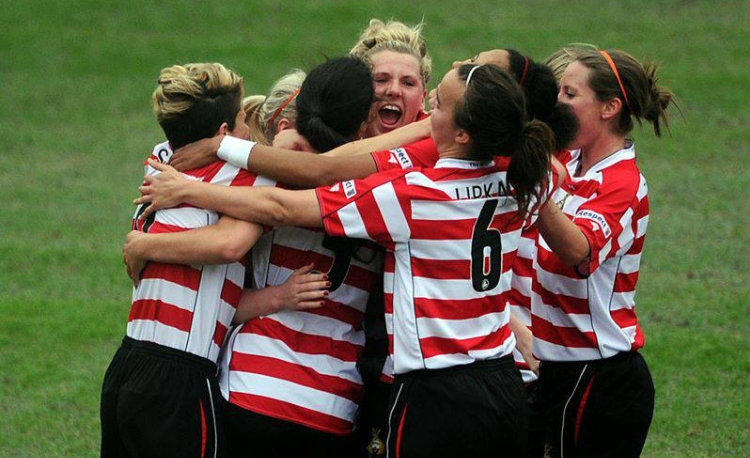
When Emma was growing up in England, in the town of Retford, South Yorkshire, there was no professional women’s league for her to aim for. As a child, she played soccer with boys, before joining a girls’ team at the age of 11.
“As soon as I started playing, I realised ‘I love this, and I’m pretty good at it’,” she says.
It wasn’t long before she joined the legendary Doncaster Belles, and broke into the first team as a teenager.
“I loved it because I was surrounded by top women, who I perceived as idols: quality players, quality people,” she says, “and being around that so young I think helped me develop.”
She was called up to the England age-group teams, and wanted to make a career as a footballer, but there were few opportunities anywhere in the world for a woman to make a living as a player.
She had become fascinated by the women’s leagues in the US, and, when she found out about the opportunities there to pursue a college education, as well as play soccer, she decided that was the best option for her.
“The ability to go to college, get an education, be funded, have everything you need – medical, coaching – all under one roof, was attractive for me, something I really needed,” Emma said.
“I didn’t have that opportunity at the time in Doncaster. I was playing for John Buckley and Paul Green – who’s now at Chelsea [as general manager] and had a great career himself – and they were both really supportive, because there wasn’t the infrastructure that there is now.
“[Doncaster Belles had] quality players and what I saw as a great training environment, but it was twice a week, then a game on the weekend.
“I landed on my feet at Penn State University, which is a fantastic institution – great footballing program, and honestly, some great coaches, which was, I think, even more impactful in my own personal journey.
“I still keep in touch with them, as mentors and friends.”
Emma had coached in schools and in the community while in England, but began giving it more time and attention in college, coaching U15s in Pennsylvania as a first step, and then progressing through her coaching licences with the support of her head coach.
“She saw that I’d got the knack for coaching,” Emma said. “I enjoyed it. I asked a lot of questions. I was always interested in the tactics of the game.”
After a brief return to England, following the end of her undergraduate study, Emma got her first full-time job coaching with St John’s University in New York as a graduate assistant.
“I was getting my Masters while coaching, and that’s when I was coaching a ton every day, a couple of hours each night. It was exhausting, but it was the best development step I could do as a coach.”
By this time, she had decided that, rather than looking to make a career as a player, it was coaching that was most likely to give her the chance of fulfilling her dream of a life in soccer.
Initially, she was working with youth teams, alongside the coaching at St John’s.
She said: “College was my main job, but I’d always been involved in coaching the youth on evenings.
“It was a way to just get better at my craft, to get better on the field, get hours, and get thrown into a various amount of age groups, because you learn your craft.
“You make mistakes. You build relationships. You understand how to find your coaching voice, what kind of leader you are, how you motivate a group.
“I think there’s no better environment than the youth game to do that.”
Related Files
During the pandemic, Emma and her wife moved to North Carolina, where she took up a role coaching at George Mason University, and then got involved with the North Carolina Courage.
“I quickly realised that I absolutely love the pro game, enjoy the competitiveness and the desire to win,” she says.
“It was in 2022 that I became full-time with the Courage, and I have been here ever since.”
Her current role is assistant coach, a job title and description that can mean many things to different people on a day-to-day basis, depending on the club.
With the Courage, she has played a role in analysis, scouting and recruitment, and, of course, works on the field with players.
“I get to experience everything that comes with the Courage,” Emma said.
“I get to coach on the field, and help in developing the players from an individual standpoint.
“What part of their game do they need to work on? That can be on the field – extra touches, set extra little 10-minute, 15-minute individual sessions – or that can be video clips to help them develop individually.
“It’s so important that you continue to develop the individual, even at this level.
“If you increase their ability, then the collective increases as a result. That’s a big part of what we do here at the Courage, and something I’ll always take wherever I go.”
Emma ultimately achieved her childhood dream of a career in football, even if it wasn’t the one she expected.
“I was so committed and determined then to be a professional footballer, and for that to be my career path,” she conceded.
“Fast-forward a few years, I’m now a professional football coach, and I absolutely love it.
“I’m happy that I did make that somewhat early decision to focus on coaching versus playing.”
If she had the chance to speak to teenage Emma, she would tell her to commit to her journey – and it’s advice she’d give to any other young coach considering their options.
“Be open to opportunities and continue to be brave in making those decisions, because this game – back then, and even more now – requires change.
“If you’re serious about following a career in sport, coaching especially, you’ve got to be prepared for change, whether that’s your team, moving states, moving countries, or [changing] lifestyle choices.
“That’s the best way you have to look at your journey in the game. Commit to it and continue working on your craft, whatever that is.”
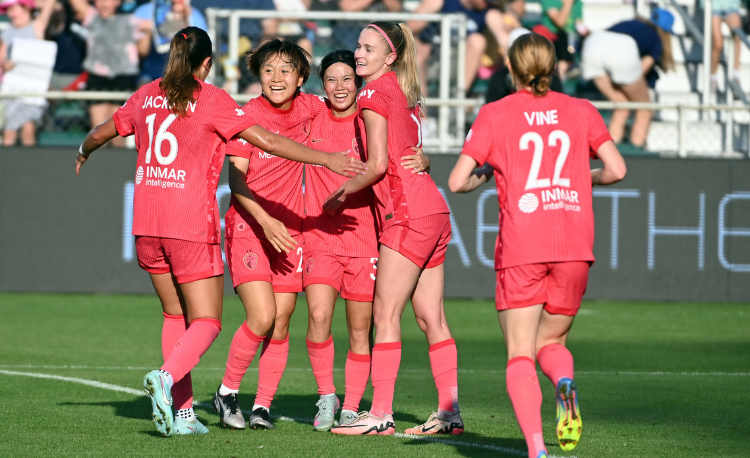
‘the people, support and infrastructure has grown’: emma on the burgeoning backroom staff operating at nwsl clubs
It is an exciting time to be involved in women’s soccer, particularly at the professional level, with the increased investment and media interest.
Emma has seen some huge changes in the US recently, starting with the sheer numbers of staff at clubs.
“It comes from standards that the league is setting and what the players are demanding,” she said.
“No longer are teams in the NWSL owned by millionaires, they’re now billionaires – which just goes to show the level of investment and the standard that this league is going [to].
“When I first joined the Courage, there were three members of [coaching] staff. We had one trainer and an equipment person. That was it.
“Now we’ve got another coaching staff member, two analysts, two trainers. We’ve got a physiotherapist and a masseuse. We’ve got player operations.
“We are actually not as big as some other teams in the league, and I’m sure, compared to Europe, our staff looks quite small.
“But the amount of people, support and infrastructure that the players have, rightly so, has grown.”
How coaching youth players allowed Emma to find her style
Emma puts much of her growth as a coach down to her time working with different age groups, which she feels allowed her the space to experiment.
“You have many ups and downs. You can try new things out on the field,” she said.
“You can follow in the club’s philosophy or style of play, but, within those parameters, you can really challenge yourself.
“That’s important because, as a coach, you go off what you learn, what you see and how you were coached. There’s no other way to develop, initially.
“It’s just like watching a teacher or watching your parents.
“As a player, you look at how your coaches lead, how they coach and how they communicate, and you emulate that.
“You only really start to find your own way and get your own experiences and style by doing it.
“The youth game really allowed me to do that.”
Newsletter Sign Up
Newsletter Sign Up
Discover the simple way to become a more effective, more successful soccer coach
In a recent survey 89% of subscribers said Women's Soccer Coaching makes them more confident, 91% said Women's Soccer Coaching makes them a more effective coach and 93% said Women's Soccer Coaching makes them more inspired.
*includes 3 coaching manuals
Get Inspired
All the latest techniques and approaches
Women's Soccer Coaching offers proven and easy to use soccer drills, coaching sessions, practice plans, small-sided games, warm-ups, training tips and advice.
We've been at the cutting edge of soccer coaching since we launched Soccer Coach Weekly in 2007, creating resources for the grassroots youth coach, following best practice from around the world and insights from the professional game.
